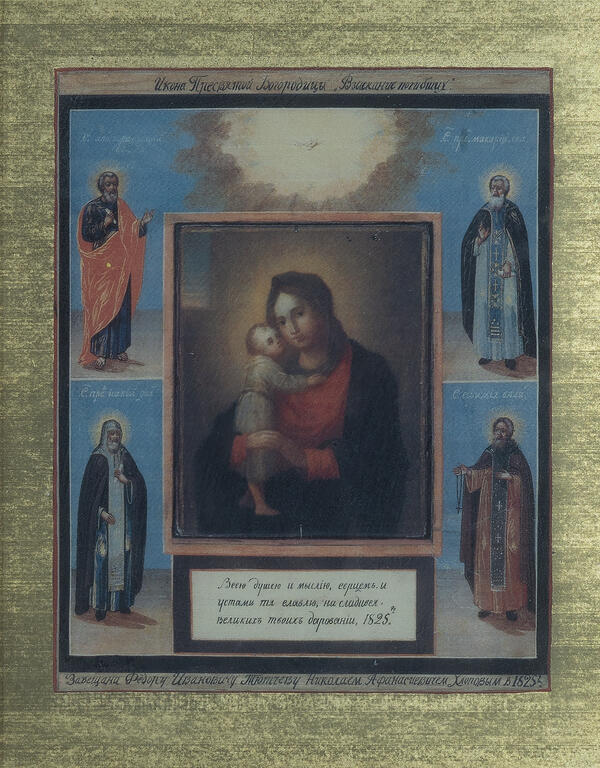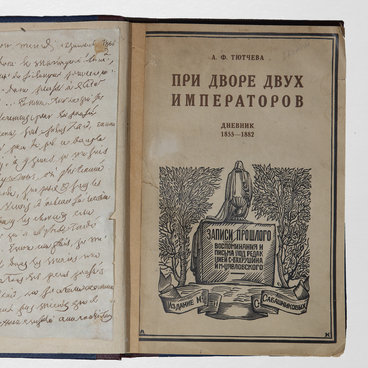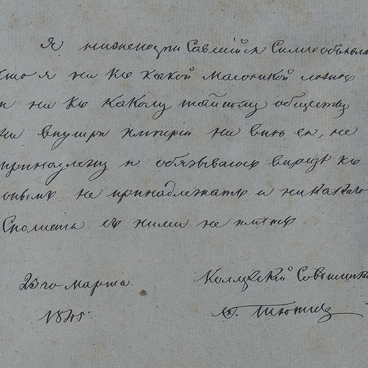Fyodor Tyutchev inherited the icon from his tutor Nikolai Khlopov. The inscription on the icon reads, ‘In memory of my sincere love and zeal for my friend Fyodor Ivanovich Tyutchev, this icon after my death belongs to him. Signed this 1826 March 5th. Nikolay Khlopov.’
From the age of four, Fyodor Tyutchev was under the supervision of his tutor Nikolai Khlopov. For the future poet, he remained a nanny and a good friend for almost two decades. Tyutchev’s parents trusted the upbringing of their child to a caring and loyal servant. Therefore, when Fyodor at the age of 18 went abroad, they could not have wished for a better companion for their son. In 1822, they arrived in Munich, where Tyutchev served for the next fifteen years.
The unfamiliar foreign environment was especially difficult for Nikolai Khlopov, who did not know German. However, this brought him and Tyutchev even closer to each other. Khlopov corresponded from Munich with Ekaterina Lvovna, the poet’s mother, and told her about her son, who rarely wrote home because of his laziness. Unfortunately, Khlopov’s letters have been lost. There is only one family memory left — it concerns the young Countess Amalia Lerchenfeld. The tutor angrily reported, ‘Fyodor Ivanovich consented to exchange watch chains with her and instead of their gold they received only a silk one in exchange.’
Khlopov also left some interesting information about the poet and did it in a rather original way. Each time he thought that a significant event happened in Tyutchev’s life, Khlopov commissioned an icon. On the back of the board, Khlopov wrote down what had happened.
In the center of the icon from the museum collection is an image of the Mother of God ‘The Seeker of the Perishing’. Khlopov reminisced,
From the age of four, Fyodor Tyutchev was under the supervision of his tutor Nikolai Khlopov. For the future poet, he remained a nanny and a good friend for almost two decades. Tyutchev’s parents trusted the upbringing of their child to a caring and loyal servant. Therefore, when Fyodor at the age of 18 went abroad, they could not have wished for a better companion for their son. In 1822, they arrived in Munich, where Tyutchev served for the next fifteen years.
The unfamiliar foreign environment was especially difficult for Nikolai Khlopov, who did not know German. However, this brought him and Tyutchev even closer to each other. Khlopov corresponded from Munich with Ekaterina Lvovna, the poet’s mother, and told her about her son, who rarely wrote home because of his laziness. Unfortunately, Khlopov’s letters have been lost. There is only one family memory left — it concerns the young Countess Amalia Lerchenfeld. The tutor angrily reported, ‘Fyodor Ivanovich consented to exchange watch chains with her and instead of their gold they received only a silk one in exchange.’
Khlopov also left some interesting information about the poet and did it in a rather original way. Each time he thought that a significant event happened in Tyutchev’s life, Khlopov commissioned an icon. On the back of the board, Khlopov wrote down what had happened.
In the center of the icon from the museum collection is an image of the Mother of God ‘The Seeker of the Perishing’. Khlopov reminisced,



